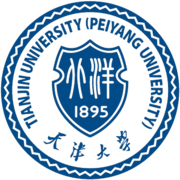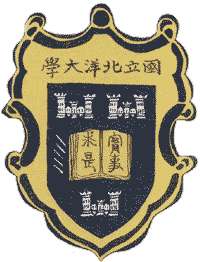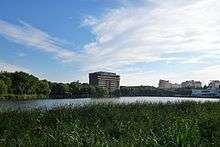Tianjin University
|
天津大學 天津大学 | |
 | |
Former names | Peiyang University |
|---|---|
| Motto |
實事求是 实事求是[1] |
Motto in English | Seeking Truth from Facts[2] |
| Type | National university |
| Established | October 2, 1895 |
| President | Li Jiajun (李家俊) |
Academic staff | 4,374 |
| Undergraduates | 15,000 |
| Postgraduates | 9,000 |
| Location | Tianjin, China |
| Website | http://www.tju.edu.cn/english/ |
Tianjin University (TJU, simplified Chinese: 天津大学; traditional Chinese: 天津大學; pinyin: Tiānjīn Dàxúe) is the first modern higher education institution in China, and now a national university under the direct administration of the Ministry of Education of China. It was established in 1895 as Tientsin University/Imperial Tientsin University (Chinese: 天津北洋西學學堂/天津北洋西学学堂) and later Peiyang University (Beiyang University) (Chinese: 北洋大學堂/北洋大学堂; pinyin: Běiyáng Dàxúetáng). In 1951, after restructuring, it was renamed Tianjin University, and became one of the largest multidisciplinary engineering universities in China. The university was one of the first 16 universities accredited by the nation in 1959. It is also among the first group of institutions of higher learning in the national “211-Project” to which priority is given in construction. In order to carry out the “21st Century Education Revitalizing Action Plan”, in late 2000 the Ministry of Education and Tianjin Municipality signed an agreement which aims to build Tianjin University into a 1st-class university in the world in the 21st Century.
History
In 1895, Sheng Xuanhuai submitted his memorial to the Guangxu Emperor to request for approval to set up a modern higher education institution in Tianjin. After approval on October 2, 1895, Peiyang Western Study College was founded by him and American educator Charles Daniel Tenney and later developed to Peiyang University. It was the first university providing four year degree modern higher education in China.[3] The university modeled itself on the famous American Universities and aimed to rejuvenate China by training qualified personnel with new scientific and technological knowledge. After the PR China's foundation and university restructures, Peiyang University was renamed Tianjin University in 1951.[4]


Peiyang University / Tianjin University contributes greatly to the Chinese society. In its early days, undergraduates had the permission to directly pursue graduate study at Harvard and Yale without any entrance exams. Its Law School, which is the first (and also the best at that time) Law School in China, was merged into Peking University and gave Peking University a fresh new start. Peiyang's Department of Aeronautics was separated and developed into Beihang University. And The Beijing University of Posts and Telecommunications, University of Science and Technology Beijing, Tsinghua University and Nankai University also have kin relationship with Tianjin University.
Timeline[4]
- 1895 Peiyang University founded
- 1899 The first modern diploma in China granted
- 1907 Developed into a comprehensive university integrating Engineering with Liberal Arts, Law and Education.
- 1935 The first group of graduate students enrolled
- 1937 The first master's degree conferred
- 1951 Merged with Hebei Institute of Technology, renamed as Tianjin University
- 1958 The first library (floor area of 14423 m2) established
- 1959 Became one of the first 16 National Key Universities
- 1981 The first group of PhD students enrolled
- 1984 The graduate school founded
- 1985 The first doctor’s degree conferred
- 1995 100th anniversary
- 1999 National University Science Park built to facilitate knowledge transfer
- 2000 Became one of the first batch of universities under “985” Project
- 2009 Bachelor of Engineering (BEng) degree program in Chemical Engineering accredited by IchemE (Institution of Chemical Engineers)
- 2010 Tianjin University New Campus Plan Launched
- 2013 Tianjin Co-Innovation Center of Chemical Science and Engineering (COIC_CSE) became one of the first 14 collaborative innovation centers of the "2011" Project
General information
Tianjin University is a key university in China, one of China’s first group of key universities of "Project 211" and "Project 985". The university currently has a working staff of over 4,600, including 342 professors, 662 associate professors, 13 academicians (5 academicians of Chinese Academy of Sciences, 8 academicians of Chinese Academy of Engineering) and 23 special engaged professors of “Yangtze Scholar Award Project” of the Ministry of Education. The total student population is 25,000 with 9500 doctoral students and students for master's degree. Over 100,000 students have graduated from Tianjin University.
The university occupies an area of 1.37 km2, and has a built-up area of 800,000 m2, including the two modern libraries, with a total floor space of 26,000 m2 and a collection of 2 million volumes.
According to the incomplete statistics, 50 experts and scholars who once studied or taught at the university have become academicians of the Chinese Academy of Sciences and the Chinese Academy of Engineering. More than 100 provincial, municipal, autonomous regional or ministerial leaders were graduated from Tianjin University since the founding of the People’s Republic of China.
Building of disciplines
A discipline layout, with stress on engineering, incorporating science, engineering, economics, management, humanities, education, law and art has been formed in the university. The university now has 6 national key disciplines and 17 municipal key disciplines. Some disciplines with advantages and characteristics such as power machinery and engineering, optical engineering, testing and measuring technology and instruments, chemical engineering, chemical technology, management science and engineering, mechanics, architecture, material science and engineering, are all leading disciplines in China and have international influence.
For the time being, the university has 12 first-grade disciplines and 49 second-grade disciplines that confer Doctoral degree, 87 disciplines conferring master's degree, 17 engineering disciplines conferring master's degree in engineering. The university also confers master's degrees in business administration (MBA) and public administration (MPA). At present there are 15 postdoctoral research programs, 4 national key laboratories, 1 national engineering research center, 2 technology research and promotion centers of national scientific and technological achievements, 7 engineering technological R&D centers and open laboratories at ministerial level.
In June 2001, the university was evaluated by the expert panel of the Ministry of Education as having successfully completed all the construction items set by “211-Project” for the Ninth Five-Year Plan Period.
Teaching
The university consists of 12 schools. Forty-three majors are available for undergraduates. In addition, the university has a Graduate School, Continuing Education School, Professional Education School, Network Education School, and International Education School. The Administrators’ Training Center of Higher Engineering Education of the Ministry of Education is also located at this university. In the undergraduate teaching evaluation organized by the Ministry of Education in 1999, the university was appraised as “Excellent”.
Scientific and technological achievements
The university boasts a strong team of professional and concurrent researchers. There are five key national laboratories, one national engineering research center, two national promotion centers for scientific and technological achievements, seven engineering research and development centers and open laboratories at ministerial level. There are over 80 laboratories, 110 research institutes, 15 experimental research and engineering development centers at the university.
Since the policy of reform and opening up to the outside world, hundreds of scientific and technological achievements of the university have won prizes. Among them, 70 won the National Natural Science Award, the National Invention Award, or the Award of National Science and Technology Progress, and 510 won the awards of science and technology progress of the Ministry of Education or at provincial or ministerial level. 393 have applied for patents, of which 278 have been patented. In 2001, the Science and Technology Park of Tianjin University became one of the 22 university sci-tech parks in China. A scientific research system consisting of basic research, applied research and R&D has been formed at the university. The university’s annual amount of financial aid received from the National Natural Science Foundation always ranks top among China’s engineering institutions of higher learning. Great achievements have been made in transforming scientific and technological achievements into productive forces. The university has established extensive cooperative relations with many large and medium-sized enterprises at home. In 2000 the university’s funds for science and technology amounted to RMB 280 million.
Since the 1980s, hundreds of scientific and technological achievements of the university have won prizes. During the Ninth Five-Year Plan period, 159 scientific and technological achievements of the university won prizes. Among them, six are the National Invention Award, nine the Award of National Science and Technology Progress, one the National Natural Science Foundation Award, 56 the Science and Technology Progress Prize of the Ministry of Education, 81 the Science and Technology Progress Award of Tianjin City, 22 other provincial or ministerial Science and Technology Progress prizes. 134 achievements were patented, in which 35 were inventions and 99 practical new-type patents.
During the Ninth Five-Year Plan period, the university’s scientific research funds amount to RMB 1.055 billion, a record high in the university’s history, and come out front among universities nationwide. In October 1999, Tianjin University, in cooperation with Tianjin Economic & Development Area, established the University Sci-tech Park. The park, evaluated by the Ministry of Science and Technology and the Ministry of Education, has been named as a trial national university park for science and technology.
In recent years, its students have won more than 100 prizes in competitions on different subjects, of which four are international prizes, 50 are national prizes. In the International architectural design competition for University Students held in 1994 and 2000, participated by over 180 colleges and universities from more than 50 countries including world-famous universities like MIT, Harvard and Cambridge University, the participants from the School of Architecture of Tianjin University won twice the highest prize which indicates the university’s educational quality and level.
Hi-tech industries
The university industries are characterized by bringing forth new ideas to technology, initiating high-tech enterprises, and transforming scientific and technological achievements into industries. Tiancai Co. Ltd. is the representative of the university’s industries, which takes advantage of the university’s superiority in science and technology. The university’s industries include computer information, packed towers, industrial crystallization, and opto-electronic integration and have made good economic as well as social benefits.
Campus culture

Tianjin University has formed a rich campus cultural atmosphere by promoting its education in ideology, politics, science and technology, culture and art. In recent years, the university has attached great importance to quality education of its students. The Students’ Union, the Students’ Scientific Society, Peiyang Art Team, and the Youth Volunteers’ Society have played active roles in organizing cultural and art festivals, science and technology festivals, sport festivals, work-study programs, and social activities in the forms of lectures, seminars, contests, soliciting articles, training and weekend music parties. The university, as a trial unit and base of national cultural quality education for undergraduates, has made remarkable achievements in cultural quality education. In 2000, Vice Premier Li Lanqing made important comments on the art education report submitted to the Ministry of Education by Tianjin University, making Tianjin University’s art education model one of the three in China. Tianjin University was chosen as a National Advanced Unit of Art education.
Cooperation and exchanges
Tianjin University was one of the first universities in China to explore cooperation with external organizations, and conducts extensive international exchanges and cooperation, keeping close relations with many institutions of higher learning, educational institutions, and transnational enterprises worldwide. The University has established cooperative relations with provinces and cities such as Hebei Province, Jilin Province, Xinjiang, Tibet, and Chongqing Municipality. Its scientific and technological cooperation can be found all over the country. The university strengthens its cooperation with transnational industrial groups in the high-tech fields. Meanwhile, the university has signed cooperation agreements with more than 20 transnational companies, and with 80 institutions of higher learning from 28 countries, conducting academic exchanges, cooperative scientific research and joint training programs.
The university invites famous scholars and celebrities to be its honorary or guest professors. To name a few, Prof. Herbert A. Simon, Nobel Prize winner of the Psychology Department of Carnegie Mellon University; Professor Gerald Vizenor, Emeritus professor of American literature at the University of New Mexico (Vizenor portrayed Tianjin University in his novel Griever: An American Monkey King in China); Dr. Yang Zhenning, famous physicist of the State University of New York; academician, world-famous mathematician Lin Jiaqiao; Mazuopin Kalin, professor of the Electrical Machinery Department of Yale University; Li Dingyi, professor of AT&T Bell Laboratory. In recent years, the university has sponsored or undertaken more than a dozen large international academic conferences, which create more channels for the university to promote international exchanges and cooperation.
The University has signed an MoU with the University of Mumbai.[5]
Tianjin University also cooperated with University of South Australia to build China-Australia Centre for Sustainable Urban Development at October 27th, 2012.[6]
Notable alumni
Gang Want
- Wang Ch'ung-hui
- Tang Shaoyi
- Ma Yinchu, economist
- Shu-tian Li, engineer and president of Peiyang
- Xu Zhimo, poet
- Zhang Tailei, leader of the Guangzhou Uprising
- Chen Lifu
- Wang Zhengting
- Huang Jiqing
- Jia Qinglin
- Larry Yung
- Sun Guangxin, billionaire businessman[7]
Notable faculty
- Hou Debang, chemical engineering expert
- Mao Yisheng, structural engineering expert
- William S.W. Lim, architect
- Feng Jicai, writer
References
- ↑ "天大简介 (Chinese)". Tianjin U. Retrieved July 14, 2014.
- ↑ "Welcome from President Li Jiajun". Tianjin U. Retrieved July 14, 2014.
- ↑ 北洋大学堂
- 1 2 "Tianjin University-Our History-Milestone". Tianjin University. Retrieved March 16, 2016.
- ↑ http://www.hindustantimes.com/HTEducation/Chunk-HT-UI-HTEducationSectionPage-OtherStories/Indian-students-should-consider-studying-in-China/SP-Article1-775497.aspx
- ↑ "天津大学-环境学院 中-澳中心". www.tju.edu.cn. Retrieved 2016-09-17.
- ↑ "Sun Guangxin". Forbes. Retrieved 24 January 2015.
External links
Coordinates: 39°06′29″N 117°10′44″E / 39.108164°N 117.178813°E